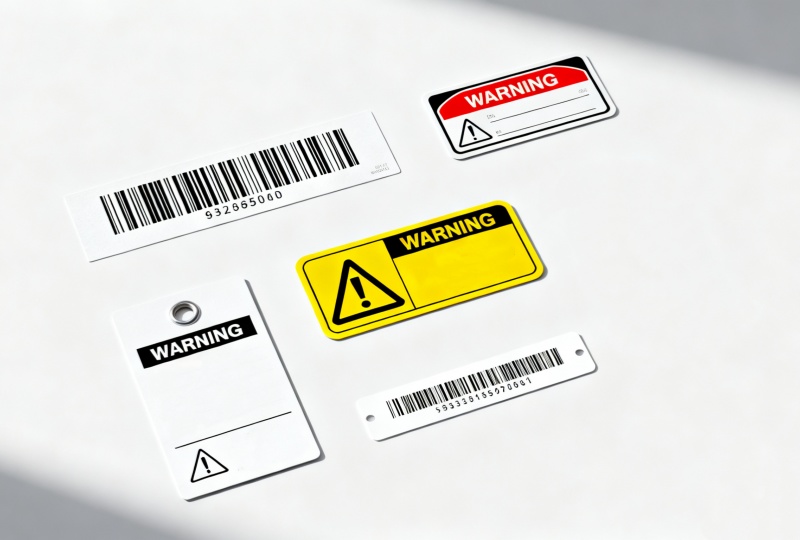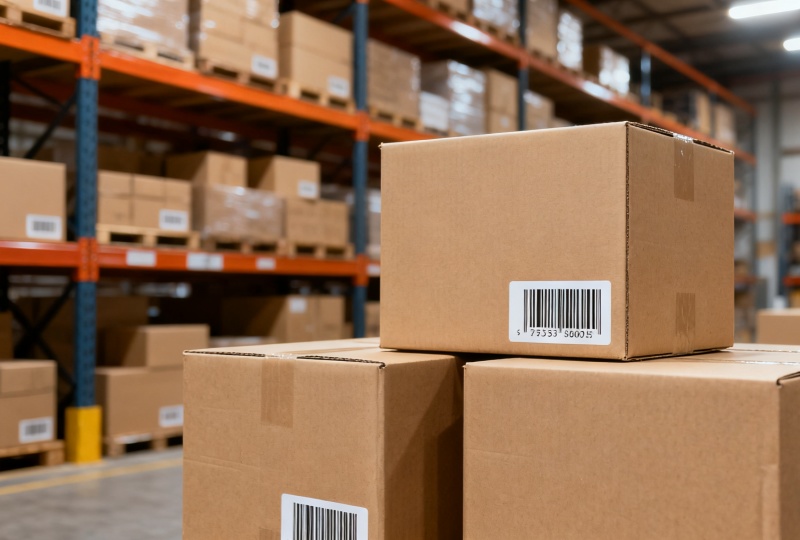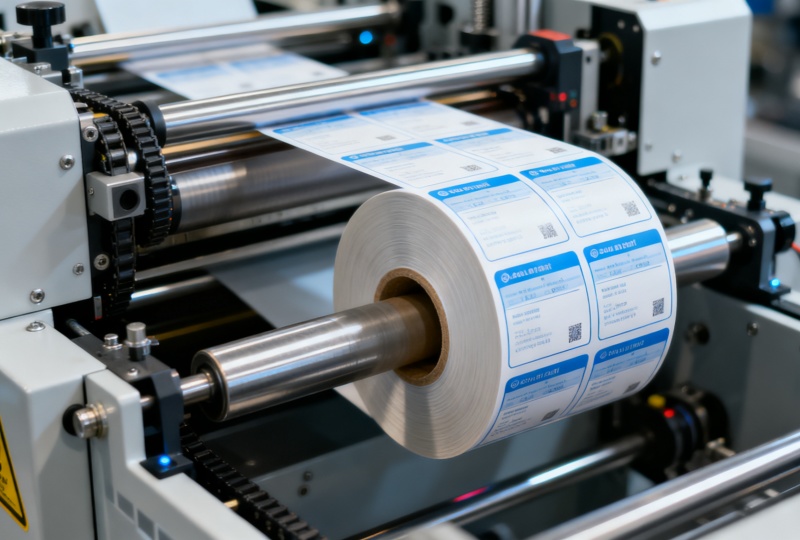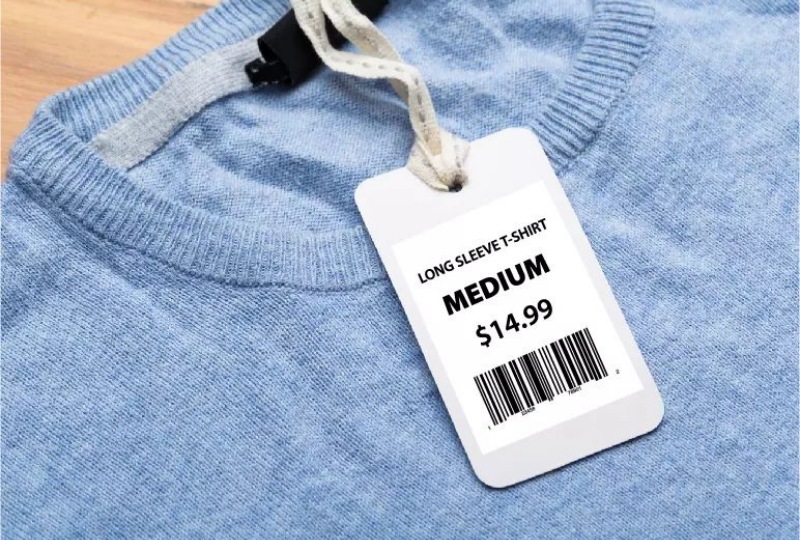Professional Industrial Label: Born for Harsh Environments
Industrial labels are heavy-duty identification stickers used on machinery, equipment, and parts in manufacturing, automotive, and other harsh environments. Unlike ordinary labels, industrial labels are engineered for extreme durability. They must withstand chemicals, moisture, heat or cold, abrasion, and UV exposure without fading or peeling. In safety-critical settings, clear warning labels and compliance tags must remain legible for years. High-strength, durable industrial labels ensure machines and parts are properly marked for safety, maintenance, and traceability. At GemmyLabel, we specialize in custom industrial labels built to survive tough conditions. Our labels use premium materials and adhesives, and we tailor each design to the client’s exact requirements. This article explores what industrial labels are, their special requirements, common uses, and why GemmyLabel is a top choice for customized industrial labeling solutions.
What Are Industrial Labels?
Industrial labels are specialized identification solutions engineered for demanding work environments. Unlike standard retail labels that focus on aesthetics, heavy-duty industrial labels prioritize durability and functionality. They’re designed to resist extreme temperatures, chemicals, moisture, and physical abrasion—challenges common in factories, construction sites, and outdoor facilities. Industrial identification labels typically carry essential data like part numbers, safety warnings, barcodes, or regulatory compliance marks. Whether used on production lines or storage containers, these labels must remain legible and intact for their entire service life.
Special Requirements of Industrial Labels
Industrial labels have stringent requirements beyond those of normal labels. They must be:
-
Extreme Durability: Able to resist oil, chemicals, abrasion, solvents, and UV light. For example, chemical plants need acid- and solvent-resistant labels, and laboratories need labels that survive sterilization processes. High-strength weatherproof industrial labels are needed for outdoor equipment exposed to rain, sun, and temperature swings.
-
Temperature Resistance: Many industrial processes involve very high or very low temperatures. Labels used on motors, engines, or electrical panels often must endure high temperatures; cryogenic equipment needs freezer-grade labels. Polyimide (Kapton) labels, for instance, can withstand hundreds of degrees.
-
Special Adhesives: The adhesive must grip uneven or rough surfaces (metal, plastic, rubber, painted concrete) and often retain adhesion in moisture or over time. IndustriTAG notes they use unique adhesive formulations for rough or low-energy surfaces like rubber or lumber.
-
Legibility & Compliance: Clear printing that resists fading is essential. Safety and hazard labels must comply with OSHA/ANSI color/symbol standards for instant recognition. Durability also ensures labels used for regulatory compliance (UL, CE, CSA markings) remain readable during audits.
-
Industrial-Grade Materials: Paper stock is generally too weak. Industrial labels typically use plastic films (polyester, vinyl, polyimide, etc.) or metalized substrates for long life.
Key features of industrial labels include:
-
Chemical and Solvent Resistance: Labels often use polyimide, polyester, or vinyl films that stand up to oils, acids, or industrial cleaners.
-
Heat and Cold Endurance: Some labels (e.g., polyimide, polyolefin, Nomex) tolerate extreme heat or sub-zero cold without cracking or fading.
-
Strong Adhesion: Special adhesives ensure labels stick to metal, plastic, or textured surfaces even under vibration or moisture.
-
Tear and Abrasion Resistance: Durable films and overlaminates protect printed data on labels subjected to scrubbing, sliding, or mechanical wear.
By meeting these technical requirements, industrial labels provide reliable, long-term performance. The table below summarizes common industrial label materials and their properties:
| Material | Key Properties | Typical Uses |
|---|---|---|
| Polyester (PET) | Durable synthetic film; resists moisture and chemicals | Outdoor equipment labels, product tags |
| Polyethylene (PE) | Tough plastic film; water-resistant with strong adhesive | Logistics/barcode labels, outdoor gear |
| Polypropylene (PP) | Durable, cost-effective, resistant to water and chemicals | Packaging, product ID, inventory tags |
| Vinyl (PVC) | Flexible, weatherproof; holds on curved surfaces | Outdoor signage, safety labels, and curved pipe labels |
| Metallized PET | Polyester with metallic finish; weather and chemical resistant | Nameplates, serial/rating plates with barcode |
| Polyimide | High-temperature resistant (to ≈260°C) | Electronics and aerospace identification |
| Polyolefin | Extreme-temp stable, abrasion-resistant | Wire marking, cable ID, insulation tags |
| Nylon | High adhesion, very conformable | Curved or irregular surfaces: cables, hoses |
| Nomex | Heat-resistant (very high temperature) | Aerospace/industrial safety labels |
Each material above is chosen for specific industrial challenges. The right material ensures that a GemmyLabel industrial label will remain intact and legible in its service environment.
Where Different Industrial Labels Are Used
|
Label Type
|
Material
|
Suitable Industries
|
Application Examples
|
|---|---|---|---|
|
High-Temperature Labels
|
Polyimide
|
Automotive, Aerospace
|
Engine parts, Heat-treated components
|
|
Chemical-Resistant Labels
|
Polyester
|
Pharmaceutical, Chemical
|
Chemical drums, Medical equipment
|
|
Food-Grade Labels
|
BPA-Free Vinyl
|
Food & Beverage
|
Processing equipment, Storage bins
|
|
Outdoor-Resistant Labels
|
UV-Stabilized Polyester
|
Construction, Logistics
|
Shipping containers, Outdoor machinery
|
Automotive industrial labels, for instance, must withstand engine heat and oil exposure, while food-safe industrial labels require non-toxic materials that won’t contaminate products. Understanding these nuances helps businesses select labels that perform reliably in their specific settings.
Manufacturing and Logistics Applications
In manufacturing facilities, industrial labels for manufacturing play a crucial role in identifying and tracking products throughout the production process. This includes labeling products with serial numbers, lot numbers, or other identifying information that must remain legible despite handling, processing, and storage conditions.
For logistics operations, industrial barcode labels are essential for accuracy and efficiency. Labels designed with scannable barcodes or QR codes allow for faster processing and reduce manual data entry errors. A common issue in logistics is label deterioration—when printing fades, smudges when exposed to elements, or labels wrinkle, making scanning difficult. Custom-built industrial labels for logistics can significantly reduce these risks and improve operational efficiency.
Extreme Environment Applications
Some industrial settings require specialized labeling solutions for extreme conditions. For instance, low-temperature industrial labels are specifically engineered for freezer storage, cold chain logistics, and other refrigerated applications. These labels use special adhesives that maintain their bond even when exposed to temperatures as low as -40°C to -50°C.
Similarly, high-temperature industrial labels are available for applications involving heat exposure, such as automotive components, electronic devices, or industrial machinery that generates significant warmth during operation.
GemmyLabel’s Custom Industrial Label Services
At GemmyLabel, we offer fully customized industrial label solutions to fit each customer’s needs. Here’s what sets our service apart:
-
Tailored Designs: We work with you to determine the best label style, size, and print format for your application. Options include die-cut shapes, variable data, full-color printing, RFID integration, barcodes, or UL markings.
-
Material Selection: With a wide portfolio of label materials (paper, PET, vinyl, polyimide, etc.), we select the optimal substrate and adhesives for your environment. Need freezer-grade labels or extreme heat warning labels? We choose the right film to ensure durability.
-
Adhesive Expertise: We offer various adhesives – permanent, removable, or ultra-aggressive – and specialty adhesives for rough or low-energy surfaces. This ensures each label sticks reliably, whether on smooth stainless steel or textured concrete.
-
Advanced Printing: Our factory employs modern printing and finishing technologies. We can produce large runs efficiently or handle short runs and on-demand needs. Options include digital/thermal printing for fast turnaround or screen/offset printing for large volumes.
-
Protective Treatments: For extra durability, we can add laminates or coatings (e.g., UV varnish, laminating films) to make labels scratch- or chemical-resistant. This keeps logos and data crisp over time.
-
Global Support: As a global manufacturer of adhesive products, we can ship labels worldwide. Our team provides one-stop support from design to delivery. We welcome OEM/ODM partnerships and support any specifications needed.
GemmyLabel’s approach is solution-oriented. Our “in-house team of label experts” can design the right identification solution.
The Industrial Label Production Process
Understanding how industrial labels are manufactured helps ensure you get the best results for your application. Our process involves several meticulous stages:
1. Artwork Preparation
The process begins with your label design. Our team reviews your artwork to ensure it’s optimized for production, checking elements like font sizes, color separation, and barcode scannability.
2. Material Selection
Based on your application requirements, we recommend the most suitable materials and adhesives. This critical step ensures your labels will perform as expected in their intended environment.
3. Prepress and Proofing
Before production begins, we create a digital proof for your approval. This step allows you to verify all design elements and make any necessary adjustments before the actual printing.
4. Printing and Finishing
Once approved, your labels move into production. We employ various printing techniques depending on your order specifications, followed by appropriate finishing options such as:
-
Protective laminates for enhanced durability
-
UV coatings for added resistance
-
Special effects like embossing or foil stamping for a premium appearance
5. Quality Control and Inspection
Every batch of labels undergoes rigorous quality checks before shipping. We verify color consistency, print alignment, material quality, and finishing accuracy to ensure your complete satisfaction.
Why Choose GemmyLabel for Custom Industrial Labels?
Our commitment to quality is unmatched: every label meets or exceeds international standards like UL, ROHS, and FDA requirements for food contact. We also offer transparent pricing with no hidden fees and dedicated account managers who guide you through the entire process. When you choose our reliable industrial label supplier services, you get more than just labels—you get a partner invested in your operational success.
About GemmyLabel
GemmyLabel (Zhejiang Gemmy Label Co., Ltd) is a professional global manufacturer of high-quality self-adhesive products. Based in Ningbo, China, our company has grown to become a comprehensive label solution provider. We emphasize innovation: our offerings range from common self-adhesive labels to linerless labels and RFID labels for industry upgrades.
Quality is at our core. We adhere to strict quality control standards and use modern testing equipment. By continuously expanding our capabilities, GemmyLabel ensures we meet diverse needs. The breadth of our product lines allows us to match almost any request with an appropriate label type or material.
Contact us today for custom industrial label solutions – our experts will help you find the perfect industrial label for your application.






